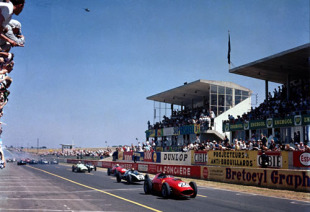- July 5 down the years
Behra fired after Ferrari punch up
What happened on this day in Formula One history
- Drivers:
- Jean Behra
- |
- Bernie Ecclestone
- |
- Mike Hawthorn
- |
- Nigel Mansell
- |
- Alain Prost
- |
- Jochen Rindt
- Circuits:
- Circuit Charade
1959
Jean Behra's promising career at Ferrari came to an end when he was involved in a punch-up with team manager Romolo Tavoni after the French Grand Prix at Reims. Fellow Ferrari driver Tony Brooks won the race and appeared to outperform Behra in front of the Frenchman's home fans. Eventually Behra retired with a broken piston and came back to the pits convinced that Ferrari had favoured Brooks over him. After a heated discussion with Tavoni, Behra threw a punch at his boss and was immediately dismissed from the team. Less than a month later Behra died racing a Porsche RSK Spyder at Avus, when he flew off the top of the 45 degree banking at the Nordkurve and hit a flag pole, dying instantly.
1953
After 300 miles of racing, the French Grand Prix was settled on the final straight when Mike Hawthorn's Ferrari passed Juan Manuel Fangio's Maserati for victory. With just a second separating the leading two cars it was widely heralded as the best grand prix since the formation of the Formula One world championship and was the first to be won by a British driver. Throughout the season there had been a tight battle for Italian pride between the Ferraris and Maseratis and it came to a head on the Reims circuit. Froilan Gonzalez (Maserati), who eventually finished third, took an early lead in his A6GCM but was running on a light fuel load by the time he pitted he was right back in the middle of a fierce battle between Fangio, Hawthorn and Alberto Ascari (Ferrari). The battle continued for the entire race with no driver able to get a discernable advantage over the others. In the end the top four crossed the line split by less than five seconds, a remarkable feat at the time after 2 hours and 44 minutes of racing.
2009
Bernie Ecclestone outraged most of the world's media when he claimed Adolf Hitler was a man who "could get things done". In an interview with The Times, Ecclestone was asked if he had a favourite historical dictator like Stalin or Napoleon and replied: When asked if he had a favourite historical dictator, like Stalin or Napoleon, Ecclestone said: "Maggie [Margaret Thatcher] has gone. In a lot of ways, terrible to say this I suppose, but apart from the fact that Hitler got taken away and persuaded to do things that I have no idea whether he wanted to do or not, he was in the way that he could command a lot of people able to get things done. In the end he got lost so he wasn't a very good dictator. Either he knew what was going on and insisted, or he just went along with it -- either way he wasn't a dictator." The comments created headlines around the world and were heavily criticised by politicians and Jewish organisations.
1981
A French Grand Prix of two halves gave Alain Prost took his first F1 victory. Nelson Piquet made a great start off the Dijon grid to lead the race ahead of John Watson, Prost, Andrea de Cesaris and Gilles Villeneuve. Prost's Renault looked quick but it took him a few laps to get past Watson's McLaren and in the meanwhile Piquet extended his lead. But on lap 58 the heavens opened and drenched the track, making it undriveable and forcing the stewards to stop the race. However, it turned out to be a passing shower and the organisers, keen to put on a show, restarted the race from the grid in the same positions the drivers had been in on lap 58. Prost was immediately all over the back of Piquet and eventually barged his way past, followed by Watson.
1992
11 years later, very similar weather conditions resulted in another French Grand Prix being split into two halves, this time at Magny Cours. Riccardo Patrese led the first half in the dominant Williams ahead of team-mate Nigel Mansell but had his lead cut to nothing with the mid-race deluge. At the restart Mansell was all over the back of Patrese and the Italian eventually, and quite obviously, waved the other Williams through. After the race Mansell avoided talking about whether Patrese had let him by: "I think it was the biggest casino of a race that we have had with regards to the weather. I must compliment Riccardo because the first race was great and it was a shame that it was stopped."
1970
Clermont Ferrand, one of the greatest grand prix circuits of all time, almost lost the right to host the French Grand Prix. However, locals just about managed to scramble together the funds to stop the race going to Albi and on this day Jochen Rindt won in front of huge crowds gathered on the hillsides. Jacky Ickx led the race in the early stages but his Ferrari flat 12 engine had sounded sick on the way to the grid and finally expired 15 laps into the race. Jean Pierre Beltoise inherited first position but was losing time with a slow puncture and eventually had to concede position to Rindt. The Lotus driver went on to take victory but despite the hard work of the locals to retain the race it went Paul Ricard the next year and only returned once more in 1972 before falling off the calendar for good.

